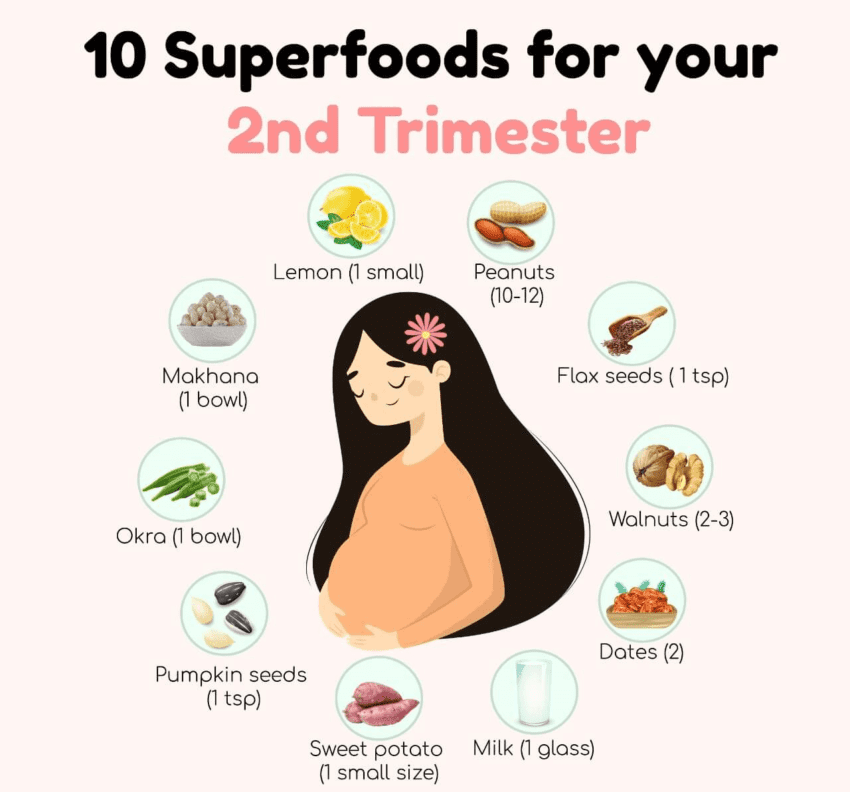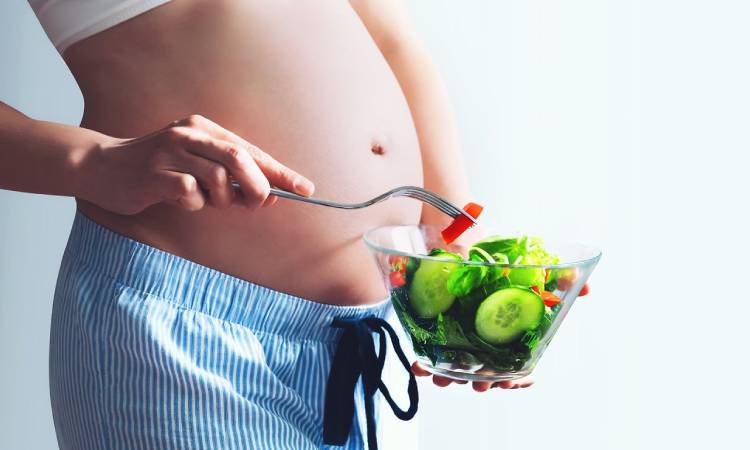High five mommy-to-be! The morning sickness and nausea are gone for good and the second trimester of your pregnancy has begun. Often called the honeymoon period of a pregnancy, the second trimester is a time to sit back, relax and enjoy your baby bump (small but visible).
Yes, your belly and the baby are happily growing.
Starting in the second trimester, you will need about 300 additional calories in your diet every day. No, you do not need to start eating for two That’s a myth.
The fact is that 300 additional calories are just a small increase in your daily calorie intake. The source of these additional calories, however, should always be something healthy, natural and nutritious.
Here are 10 Superfoods that you must include in your daily diet for the optimum growth and development of your baby:
Milk (1 glass)
A glass full of calcium, vitamin D, omega-3 fatty acids and protein, milk is one of the best natural drinks that an expectant mother can drink. To build healthy new cells, a growing fetus relies heavily on protein. Milk protein is highly digestible, so your body is actually able to pass on the benefits of milk protein to the baby.
In addition to protein, the body uses calcium from the milk to help build developing baby’s bone, teeth, heart, muscles, and nerves. Equally important is Vitamin D without which you would not be able to absorb an adequate amount of mineral.
It plays a vital role in making the bones and the immune system of the baby strong. It also contributes to healthy birth weight.
Walnuts (2-3)
Often called the brain-boosting food, walnuts are the richest source of antioxidants, Omega 3 and Omega 6 fatty acids. According to a research study published in the European Journal of Epidemiology, eating walnuts during pregnancy may lead to improved cognitive ability in children.
The kids scored higher on the tests of memory, attention, and IQ. Walnuts are also good sources of protein and fiber. Plus, walnuts boots the body’s melatonin levels, which can help cure the restless nights that women often struggle with during pregnancy.
Flaxseeds ( 1 tsp)
These may look tiny but they pack a powerful punch of energy-proving B vitamins, brain-boosting omega 3 fatty acids, fiber, and anti-inflammatory antioxidants. Rich in insoluble fiber, which triggers bowel movement, flaxseeds help relieve constipation.
These tiny seeds also help control the blood sugar levels, which increases the chances of high birth weight and C-section delivery. Also, nutrients like magnesium, selenium, and potassium are replenished when flax seeds are taken daily. However, keep your intake of flaxseeds to one tablespoon per day only.
Some of the side-effects include allergic reactions such as breathing problems, swelling of lips and tightness of chest. You can also experience a sudden increase in blood pressure when you consume raw or unripe flaxseeds.
Peanuts (10-12)
If you are not allergic to peanuts, it is safe to have them in pregnancy. They are an ideal snack for pregnant women. Peanuts contain folate and protein. Pregnant women are advised to take folate and folic rich foods to help prevent birth defects, particularly of the developing brain and spine.
These are also a good source of healthy fats and help keep the blood pressure under check. For vegetarians, peanuts are a good source of Omega 3 fatty acids and protein. It is advisable to consume raw peanuts instead of salty peanuts (high in sodium) and peanut butter (high in refined sugar).
Makhana (1 katori)
Low in calories and glycemic index, makhanas are rich in protein, calcium, fiber, and minerals like iron and phosphorous. With zero cholesterol and saturated fat, munching Makhana helps you avoid weight gain yet feel full. Rich in vitamin B complexes and fiber, these help lower the glucose level in the blood, making it a healthy snack for women suffering from gestational diabetes. Being high in it potassium and magnesium level and low in sodium level, a cup of makhana also help in controlling blood pressure. It also soothes the mind and regulates the sleeping pattern.
Pumpkin seeds (1 tsp)
During pregnancy, the body is known to produce more red blood cells in order to enhance the baby’s growth, hence the need for iron shoots up. One tablespoon of pumpkin seeds a day can help fight iron deficiency during pregnancy.
These seeds are also a rich of zinc, which helps in DNA production that aids rapid cell growth in the fetus. Vitamin B in pumpkin seeds help overcome pregnancy fatigue. Want a sound sleep? Pumpkin seeds contain tryptophan (an amino acid), which your body converts into the sleep hormone melatonin.
Sweet potato (1 small size)
Stir-fried, baked or boiled, sweet potato is a great healthy addition to your pregnancy diet. It is low in calorie, fat-free, rich in fiber and an excellent source of vitamin A. It is also rich in other nutrients such as zinc, iron, magnesium, potassium, sodium, calcium vitamin C and B1.
The large amount of fiber, amino acids in sweet potato help stimulate the digestive system to work smoothly, thus preventing constipation effectively. It also makes you feel full and reduces blood sugar spike.
Dates (2)
Got sugar cravings? Have some dates! Yes, sweetness without calories. Dates also make the tummy full, treat pregnancy-related constipation, reduce cholesterol level and maintain a healthy weight. These sweet treats are a rich sources of amino acids, folate, iron and Vitamin K.
Plus, the magnesium in dates help in the formation of teeth and bones in the baby. It also regulates your blood sugar and blood pressure levels.
Lemon (1 small)
What’s more refreshing than lemonade? This drink offers a healthy concoction of vitamins and minerals that include calcium, folate, phosphorous, magnesium, copper, manganese Vitamin C and vitamin B-6 – all these nutrients are vital for the healthy growth and development of your unborn baby.
Drinking lemon water can keep your cholosterol levels in check, regulate blood sugar, provides relief from constipation, and boost the immune system. The calcium & magnesium content in lemons can improve the bones health of the baby. and maintain bone strength.
Okra (1 katori)
A low-calorie vegetable that is rich in folate and riboflavin, there are many benefits of eating okra. Folate reduces the risk of brith defects. It is packed with vitamin C which aid in the absorption of iron in the body and promotes development of skin, capillaries & bones of the baby.
Okra comes with a double delight – it has both soluble and insoluble fiber. While soluble fiber works to lower blood cholesterol and also helps with diabetes, insoluble fiber promotes digestion. The essential amino acids like trytophan in okra, which aids in getting quality sleep, making it a perfect veggie for dinner.
There is more to those 9 months of pregnancy than meets the eye.
For our lightweight, healthy & deeply nourishing Pregnancy and Postnatal Nutrition Plan
Cheers,
Lovneet




